| Article ID | Journal | Published Year | Pages | File Type |
|---|---|---|---|---|
| 8745080 | Current Opinion in Microbiology | 2018 | 9 Pages |
Abstract
Hfq, an RNA chaperone, promotes the pairing of small RNAs (sRNAs) to target mRNAs, mediating post-transcriptional regulation of mRNA stability and translation. This regulation contributes to bacterial adaptation during stress and pathogenesis. Recent advances in sequencing techniques demonstrate the presence of sRNAs encoded not only in intergenic regions but also from the 3â² and 5â² UTRs of mRNAs, expanding sRNA regulatory networks. Additional layers of regulation by Hfq and its associated RNAs continue to be found. Newly identified RNA sponges modulate the activity of some sRNAs. A subset of sRNAs are proving to be bifunctional, able to pair with targets and also encoding small ORFs or binding other RNA binding proteins, such as CsrA. In addition, there are accumulating examples of Hfq inhibiting mRNA translation in the absence of sRNAs.
Related Topics
Life Sciences
Immunology and Microbiology
Microbiology
Authors
Kumari Kavita, Francois de Mets, Susan Gottesman,
